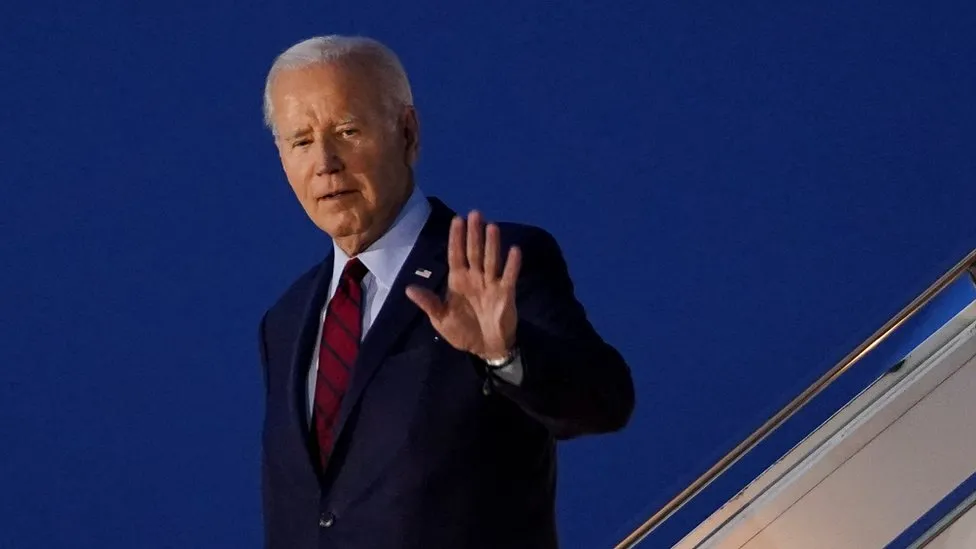Joe Biden in UK to meet Sunak and King Charles amid Ukraine concerns
US President Joe Biden has landed in the UK ahead of a Nato summit in Lithuania later this week - which comes after several allies questioned his call to send cluster bombs to Ukraine.

The UK and Canada are among those who voiced concern about supplying the bombs, which are widely banned because of the danger they pose to civilians.
The US says they are needed because Ukraine's weapon stocks are dwindling.
On Monday, Mr Biden will meet UK Prime Minister Rishi Sunak.
The two men are expected to discuss various issues, including the war in Ukraine.
Mr Sunak has not directly criticised his US counterpart following Friday's cluster bomb announcement - but on Saturday he said that the UK was one of 123 countries signed up to the Convention on Cluster Munitions, an international treaty which bans the production or use of the weapons.
Other US allies have gone further, however. Nato partner nation New Zealand said on Sunday the munitions could cause "huge damage to innocent people".
Cluster bombs typically release lots of smaller bomblets that can kill indiscriminately over a wide area. Unexploded bomblets can linger on the ground for years before they detonate.
The US says it has received written reassurances from Kyiv that Ukrainian troops will not use the weapons in Russia or in urban areas.
Members of Nato - a military alliance of 31 Western nations - will then meet in Vilnius on Tuesday and Wednesday. Boosting ammunition stockpiles and reviewing defence plans will be on the agenda.
Finland will attend its first summit since joining in April, and plans from Sweden to follow suit have been blocked by Turkey, which accuses it of harbouring terrorists. Mr Biden is expected to seek support from Mr Sunak to help broker a deal with Turkey.
Ukraine harbours its own ambitions of joining Nato. But speaking to CNN before his trip, Mr Biden said this could not happen until the war was over - in line with the alliance's long-standing policy.
Citing Nato's mutual defence pact, Mr Biden pointed out that members undertake to protect "every inch" of each other's territory - meaning that "if the war is going on, then we're all in war".
Ukrainian President Volodymyr Zelensky has previously accepted this position, while requesting a "signal" that his country will be able to join the alliance when the war is over. He is expected to attend this week's summit.
The US decision to fulfil a Ukrainian request for cluster bombs came on Friday. Officials said this was part of a military aid package worth $800m (£626m).
Mr Biden told CNN it had been a "very difficult decision" but that he had eventually acted because "the Ukrainians are running out of ammunition".
But a number of Nato allies quickly distanced themselves from the decision.
Canada and Spain - both member states - added their own opposition to that of New Zealand.
"No to cluster bombs and yes to the legitimate defence of Ukraine, which we understand should not be carried out with cluster bombs," Spain's Defence Minister Margarita Robles said.
But Germany, another signatory of the treaty and Nato member, said that while it would not provide such weapons to Ukraine, it understood the American position.
One of the concerns surrounding their supply is their failure - or dud - rate. Unexploded bomblets can indiscriminately detonate.
But the US has said its cluster bombs fail less frequently than those Russia is already using in the Ukraine war.
Ukraine has promised the weapons will not be used in civilian areas and will monitor and report on their use, but Russia dismissed these assurances as "not worth anything".
This is, potentially, an awkward visit coming at a critical time for the US-led Nato alliance.
President Biden may not have intended to cause offence by skipping King Charles' coronation in May, but his absence was noted.
Then there is the business over who should be the next secretary general of Nato. The UK and the Baltic states favoured the British Defence Secretary, Ben Wallace, who has been instrumental in galvanising Western support for Ukraine.
But without US backing, that's a non-starter - and Mr Biden instead appears to favour the former German defence minister and European Commission head, Ursula von der Leyen.
And there is also the row over cluster bombs. The UK is among 123 nations to ban these weapons which can cause indiscriminate harm to civilians.
But the US is going ahead, in the heat of international criticism, in supplying them to Ukraine as its forces struggle to break through Russia's defences in the south of Ukraine.
But Mr Biden's stopover in Britain is so brief that any cracks in the transatlantic alliance are likely to be smoothed over by warm handshakes and ample protocol.
-bbc







